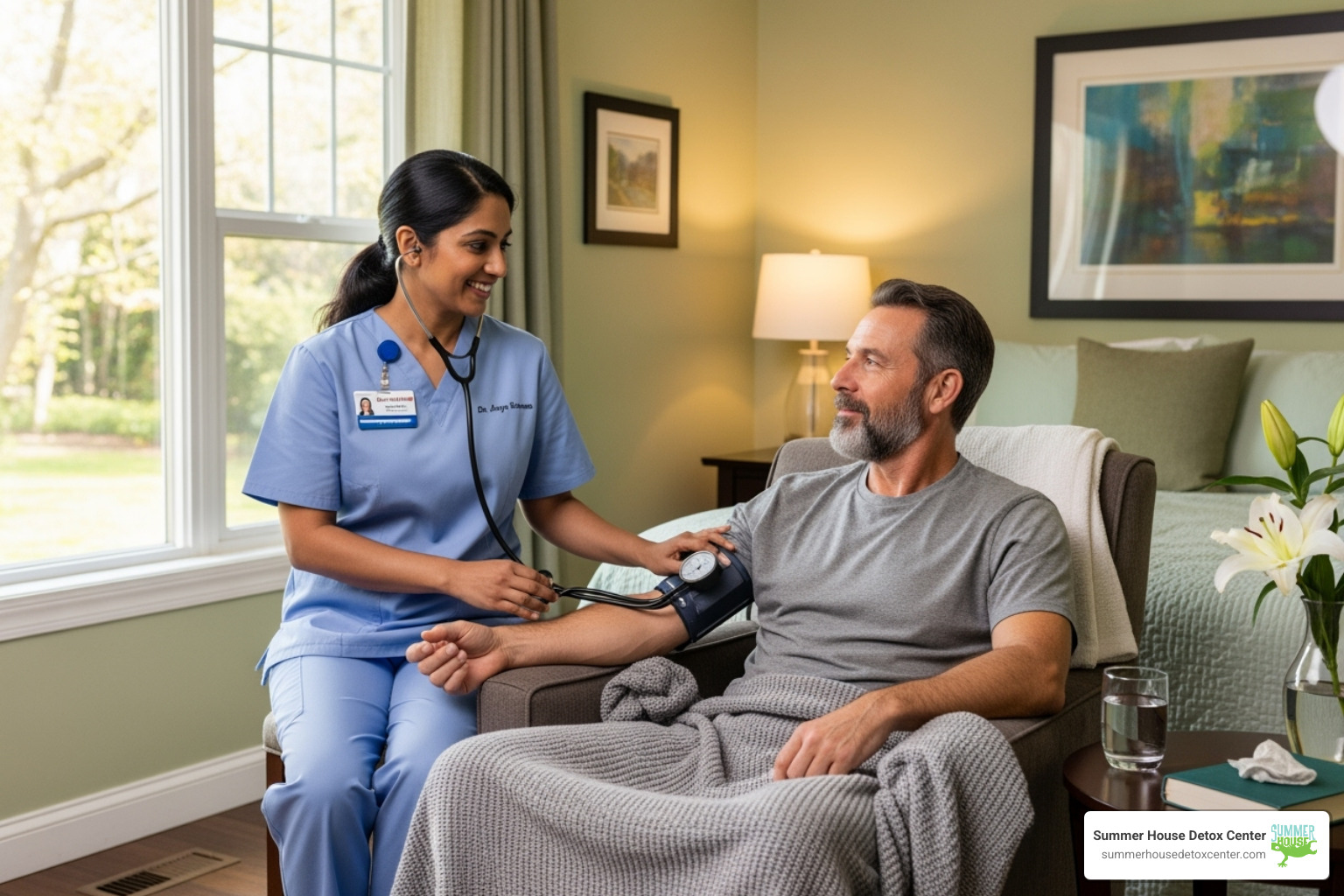Why Understanding Your Alcohol Detox Timeline Matters
How long does alcohol detox take is a common question for those considering recovery. The short answer: acute withdrawal symptoms typically last 5-7 days, but your personal timeline can vary.
Here’s a general timeline:
- 6-12 hours: Early symptoms like anxiety, headaches, and nausea begin.
- 12-48 hours: Symptoms intensify, with potential tremors and confusion.
- 48-72 hours: This is the peak withdrawal period with the highest risk for severe complications.
- 4-7 days: Symptoms start to subside.
- Weeks to months: Some psychological symptoms (PAWS) may linger.
Many in Miami and across Florida delay treatment, fearing the unknown. But understanding what to expect can reduce anxiety and help you prepare for a safer recovery. The detox process follows a predictable pattern, though your experience is unique. Factors like your drinking history and overall health influence your timeline. Most importantly, medical supervision makes the process safer and more comfortable.
Your recovery journey in Florida starts with this crucial first step. With proper medical support, thousands successfully steer withdrawal every year.

Explore more about:
How long does alcohol detox take? A Step-by-Step Timeline
When you ask how long does alcohol detox take, you’re referring to the acute withdrawal period. This is when your body readjusts after alcohol is removed, causing both physical symptoms like tremors and psychological symptoms like anxiety. These symptoms follow a predictable pattern: they start mild, peak around day 2-3, and then gradually improve.
Understanding this timeline can ease the fear around detox. While everyone’s journey is unique, knowing what to expect helps you prepare mentally and physically.
At Summer House Detox Center in Miami, our medical team understands how your body heals during this critical time. You can learn more about The Science Behind Detox: How the Body Heals From Substance Abuse.
6-12 Hours: The Onset of Symptoms
The first signs of withdrawal usually appear within 6 to 12 hours of your last drink. These early symptoms can feel like a bad hangover. You may experience anxiety, restlessness, headaches, and insomnia. Nausea is also common, sometimes leading to vomiting and a loss of appetite. Some people notice mild hand tremors. While these symptoms may seem manageable, they are your body’s warning signs of alcohol dependence. Understanding Alcohol Withdrawal Signs: How to Know You Need Professional Alcohol Detox Treatment can help you make the safest choice.
12-48 Hours: Symptoms Intensify
Symptoms typically intensify between 12 and 48 hours as your central nervous system becomes overactive. Your blood pressure and heart rate may increase, and confusion can make it hard to think clearly. Tremors often become more pronounced. Many people experience hallucinations (visual, auditory, or tactile). The risk of seizures also increases during this period, which is why medical supervision is critical. Our team at Summer House Detox Center in Miami is trained to manage these escalating symptoms. You can find more information in our Alcohol Detox Timeline.
48-72 Hours: The Peak of Acute Withdrawal
This is often the most challenging part of detox, as symptoms peak between 48 and 72 hours. The risk of serious complications like Delirium Tremens (DTs) is highest. You might experience high fever, profuse sweating, and severe disorientation. Your heart rate and blood pressure can reach dangerous levels. Delirium Tremens is a medical emergency involving severe confusion, agitation, and life-threatening seizures. According to the DSM-5, this condition requires immediate medical attention. With proper medical support, once you pass this peak, the worst is over.
Day 4-7+: Symptoms Begin to Subside
After the 72-hour mark, acute withdrawal symptoms begin their gradual improvement. You’ll likely feel fatigued as your body recovers. Mood swings are common as your brain chemistry rebalances. Sleep and appetite will slowly return. For most, the acute phase ends within a week. However, some psychological symptoms can linger as Post-Acute Withdrawal Syndrome (PAWS). As your body heals, you can begin focusing on the skills needed for long-term sobriety. Learn more about what comes next in our Alcohol Abstinence Timeline.
Why Does the Alcohol Detox Timeline Vary So Much?
While we’ve outlined a general timeline, how long does alcohol detox take is highly individual. No two detox journeys are identical, which is why personalized care is essential for a safe and effective process.

At Summer House Detox Center, we provide medically supervised detox customized to your unique needs. Understanding the factors that influence your journey is the first step toward a successful recovery.
Factors That Influence Your Detox Journey
Several key elements impact the duration and severity of alcohol detox. Our team in Miami, Florida, conducts a thorough assessment to create the right plan for you. We consider:
- Length and amount of alcohol use: Longer, heavier drinking typically leads to more intense withdrawal.
- Age and physical health: Older individuals or those with pre-existing medical conditions may have a more complicated withdrawal.
- Co-occurring mental health conditions: Anxiety or depression can worsen withdrawal symptoms.
- Polysubstance use: Using other drugs alongside alcohol can complicate and prolong detox.
- Genetics: Some people are genetically predisposed to more severe withdrawal.
- Previous detox history (kindling effect): Repeated detox attempts can make each subsequent withdrawal more severe and dangerous, increasing the risk of seizures and DTs.
How long does alcohol detox take for mild vs. severe cases?
The spectrum of withdrawal severity directly impacts the timeline.
- Mild cases: For those with less severe dependence, symptoms are less intense and usually resolve within a week.
- Severe cases: For significant dependence, physical symptoms can last up to two weeks, while psychological symptoms may persist for months.
The unpredictable nature of withdrawal means even mild cases can escalate. A professional assessment is critical. Research shows that about 50% of people with alcohol use disorder experience withdrawal when they stop drinking. Our team at Summer House Detox Center carefully assesses each client to ensure the safest and most effective detox plan.
The Dangers of Detoxing Alone: Understanding Severe Withdrawal
When asking how long does alcohol detox take, many wonder if they can handle it at home. While the desire for privacy is understandable, detoxing alone can be life-threatening. When you stop drinking, your suppressed central nervous system goes into overdrive, which can trigger dangerous and unpredictable medical complications.
Emergency rooms in Miami and throughout Florida frequently treat people for severe, unmanaged alcohol withdrawal. What starts as anxiety can rapidly progress to seizures. This isn’t to scare you, but to stress why professional support is vital.

You can learn more about The Importance of Medically Supervised Detox: Why DIY Detox Can Be Dangerous.
What is Delirium Tremens (DTs)?
Delirium Tremens (DTs) is the most severe form of alcohol withdrawal, typically appearing 48 to 72 hours after the last drink. DTs is a medical emergency. Symptoms include severe confusion, profound agitation, high fever, vivid hallucinations, and intense tremors. Most dangerously, seizures can occur without warning.
DTs is fatal in 5% to 15% of cases, even with medical care. Without it, that number jumps to 20%. These statistics represent real people who might have survived with proper medical support.
The Critical Role of Medical Supervision
At Summer House Detox Center in Miami, medical supervision transforms a dangerous process into a manageable one. Our goal is to help you detox with comfort, dignity, and hope.
- Around-the-clock monitoring: Our team continuously watches your vital signs and symptoms, allowing for immediate intervention if complications arise.
- Professional symptom management: We use medications like benzodiazepines to reduce anxiety, prevent seizures, and manage tremors. We may also use anti-seizure medications and beta-blockers.
- Nutritional support: We provide IV fluids and essential vitamins like thiamine and folic acid to address deficiencies and prevent serious complications.
- Safe, supportive environment: Our facility offers a trigger-free space where you can focus on healing, supported by staff who understand your experience.
The question isn’t just how long does alcohol detox take – it’s how safely you can steer it. Professional detox sets the foundation for long-term success. Learn more about Why Medical Detox is a Vital First Step in Recovery.
Beyond the First Week: Navigating Post-Acute Withdrawal Syndrome (PAWS)
If you’re wondering how long does alcohol detox take to truly feel like yourself again, the answer extends beyond the first week. While intense physical symptoms fade, your brain continues healing. This ongoing process can bring challenges weeks or even months after detox. This is a normal phase of recovery called Post-Acute Withdrawal Syndrome, or PAWS.
Understanding PAWS is crucial for setting realistic expectations. It’s not a setback; it’s a sign that your brain is actively healing from long-term alcohol use. This knowledge can help you stay committed to your recovery.
What is Post-Acute Withdrawal Syndrome (PAWS)?
PAWS occurs as your brain chemistry rebalances after functioning with alcohol for a long time. Symptoms can come and go unpredictably. You might have several good days, then suddenly feel anxious or foggy. Common symptoms include:
- Mood swings
- Lingering anxiety
- Low energy and motivation
- Sleep disturbances (insomnia, vivid dreams)
- Difficulty concentrating (“brain fog”)
- Intermittent alcohol cravings
Research shows that post-acute withdrawal symptoms can affect people for months or even years, but each day brings your brain closer to health.
How long does alcohol detox take to feel normal again?
The time it takes to feel “normal” varies. The acute phase is about a week, but PAWS can extend the timeline for weeks or months, with symptoms becoming less frequent and intense over time.
Recovery means building a new, healthier normal. Coping strategies are essential. Continued therapy, support groups, and a healthy lifestyle support your brain’s healing. Stress management techniques like meditation or yoga can help when symptoms flare. Most importantly, be patient and compassionate with yourself.
Aftercare is critical during this phase. At Summer House Detox Center, we help you create a solid plan for continued care, connecting you with resources in Miami for long-term success. PAWS is a sign of progress, and with support, you can steer it successfully. Learn more about What Happens After Alcohol Detox? to prepare for this important next chapter.
Frequently Asked Questions about Alcohol Detox in Florida
It’s natural to have questions when considering recovery. We hear from people across Miami and Florida every day about the detox process. Here are answers to some common questions to provide clarity and ease your worries.
What medical treatments help manage alcohol withdrawal?
Medically supervised detox uses proven treatments to make your withdrawal as safe and comfortable as possible. Our team at Summer House Detox Center uses a variety of therapies based on your needs.
- Benzodiazepines: These are the primary treatment to calm the nervous system, reduce anxiety, and prevent dangerous seizures.
- Other Medications: We may use anti-seizure medications or beta-blockers to manage physical symptoms like a rapid heartbeat and high blood pressure.
- IV Fluids and Vitamins: Dehydration and nutrient deficiencies are common. We use IV fluids for hydration and provide crucial vitamins like thiamine (Vitamin B1) and folic acid to prevent neurological complications.
Throughout this process, our medical team uses professional assessments to monitor your progress and adjust your treatment as needed.
Can I just taper off alcohol at home to avoid withdrawal?
We understand why tapering at home might seem like a gentler option, but this approach is rarely effective and can be dangerous. It’s difficult to manage the reduction accurately without medical expertise, which often leads to a relapse.
The biggest risk is the unpredictability of withdrawal. Life-threatening complications like seizures can still occur suddenly and without warning. For your safety, professional guidance is essential. Our medical team can manage your withdrawal safely with medication and support.
What happens after detox is complete?
Completing detox is a huge achievement, but it’s the beginning of your recovery journey, not the end. Detox addresses physical dependence, but the real work of building a lasting, sober life comes next.
- Transition to Rehab: Your next step is often an inpatient or outpatient program. Our team works with you to determine the right fit for your circumstances.
- Therapy: Individual and group therapy helps you identify your triggers, develop healthy coping mechanisms, and address any underlying mental health conditions.
- Support Groups: Groups like Alcoholics Anonymous or SMART Recovery provide invaluable peer connection and encouragement from others who understand your journey.
- Building a Sober Life in Florida: Recovery is about creating a fulfilling life that doesn’t revolve around alcohol. Our network of resources in Miami and across Florida can help you connect with ongoing support to build this new chapter.
Your Path to Recovery Starts with a Safe Detox
If you’ve read this far, you’re already taking a brave step. Understanding how long does alcohol detox take is empowering, but the right support is needed to get through it safely.
While acute withdrawal typically lasts 5-7 days, your journey is unique. What never changes is the importance of medical supervision. Detoxing alone is dangerous. Unpredictable complications like seizures or Delirium Tremens can be fatal. Professional care isn’t just helpful—it’s essential.
At Summer House Detox Center in Miami, we understand the fear and uncertainty. Many of our staff have walked this path themselves. We’ve created a safe space where you can focus on healing, surrounded by people who get it.
Our personalized, medically supervised care prioritizes your comfort and dignity. From 24/7 monitoring to nutritional support to compassionate guidance, we’re with you every moment of this journey.
Recovery is possible, and it starts here in Miami. Don’t let fear hold you back from the life you deserve.


